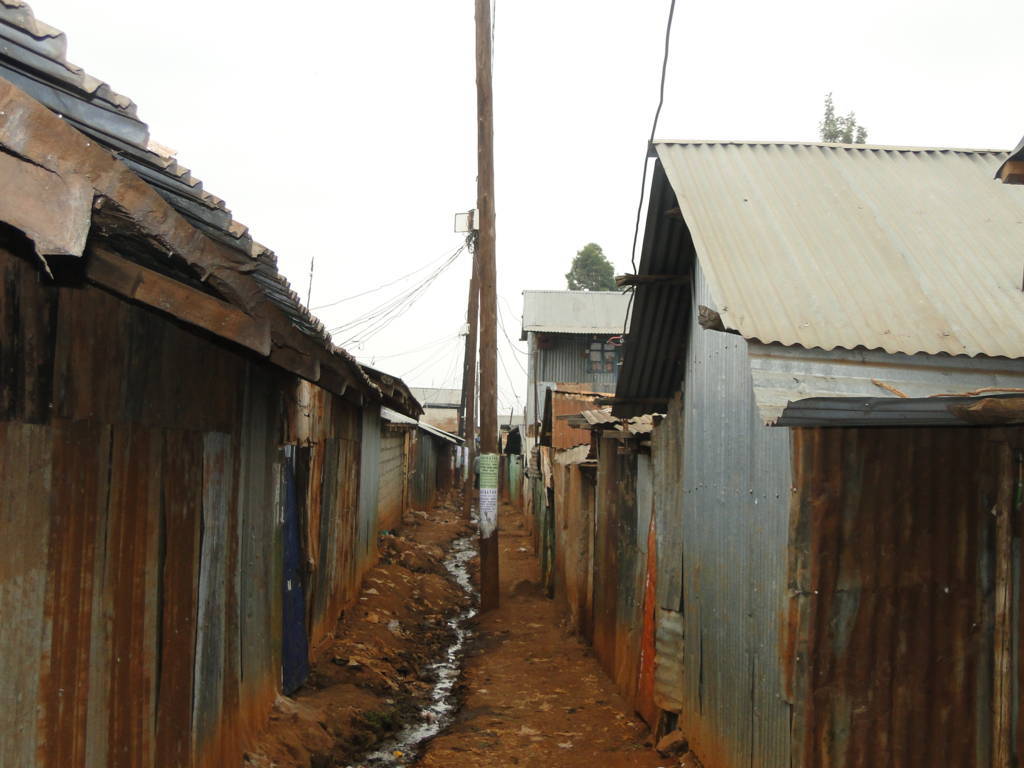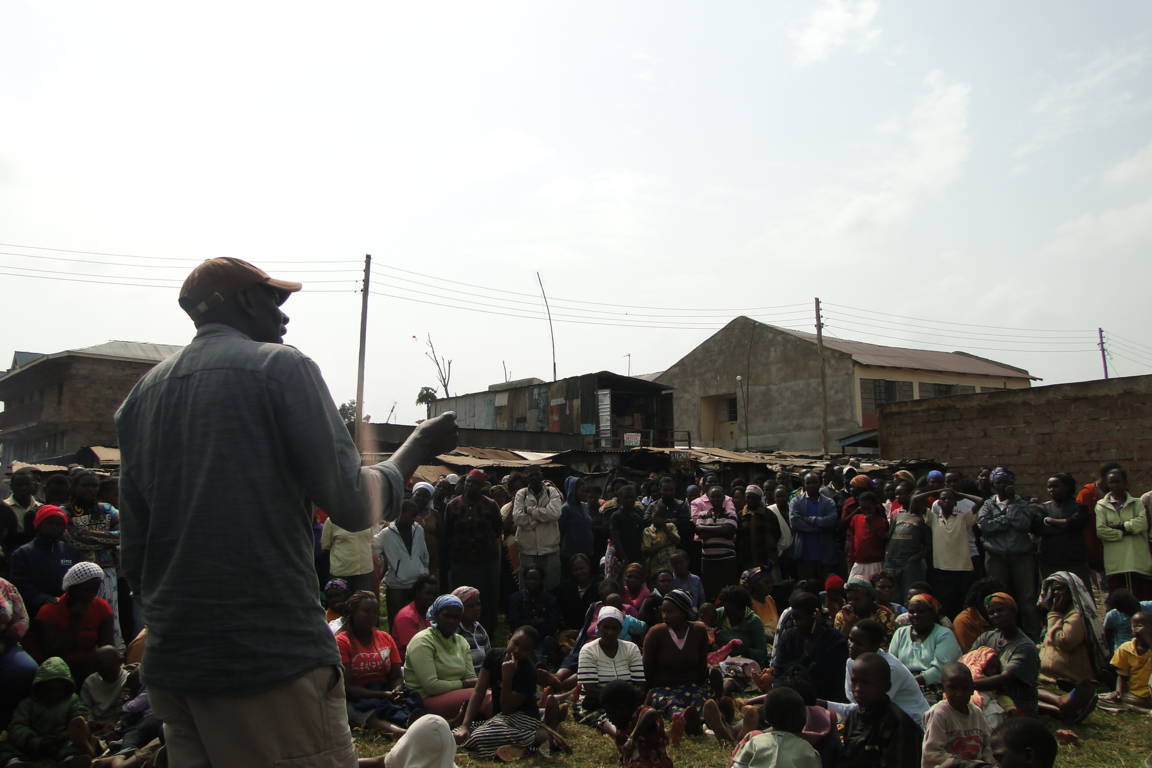Settlement, “Jua Kali” puts Land Grabbers on Notice
By Nyasani Mbaka and Joseph Muturi
Kenyan slums, and particularly those in the capital Nairobi, are arguably among the worst serviced in Africa. The root of the problem, say housing rights activists, is a failure of the government to adequately address the urban land issue. Informal settlements are often not recognized as inhabited areas by the authorities, with the result that they can be alienated at any time.
The provincial administration, represented by local chiefs, reportedly allocates public or private unclaimed land in slums to private individuals and firms. This quasi legal security of tenure has kept millions of slum dwellers in limbo and at the mercy of the provincial administration, which makes them prone to land grabbers with money bags.
Slums may be referred to as informal settlements not only because the development of housing but also because the allocation of land has no legal basis. As a consequence of the distorted land allocation process slum households are rent-paying tenants (World Bank, 2006, 36). Thus slums, which were historically located on public land, are now turning into private properties that operate like the formal real estate market.
Because the land on which the squatters and slum dwellers live is potentially valuable real estate, "land grabbing" (irregular allocation or sale of public land to individuals or organizations that have proved their loyalty to the state apparatus) is extremely common.
The above described scenario indeed defines Jua Kali settlement, Gathara Village located in Thome-Marurui estate in Nairobi’s Kasarani Area. The settlement sprouted in 1989, when what used to be the Marurui Coffee plantation, initially owned by white farmers at the height of the colonial period, was transformed into a settlement scheme so as to accommodate a significant number of people who worked in the coffee plantations for years. The settlement came into being after local farmers, workers and the then local leadership advocated for the release of the farm to the community, so as to meet the growing housing demands of the poor.
Basic Services
In the course of 1989 and 1990, Chief Kiarie the then area Thome-Marurui chief, oversaw the subdivision of 30 by 10 pieces of land for the squatters.
The settlement enjoys basic services that include; electricity, water and drainage systems (funded by Child Fund). One of the water projects in the settlement was also funded by the Catholic Chariters, which saw the community connected to an all year round water system, from Garden Estate.
The settlement is home to 6,000 residents, without including children. An eviction will jeopardize the live hood of the community members since the settlement harbors houses, churches, schools and businesses.
The settlement has basic access to electricity drainage and water
The Thome-Marurui community members have occupied the 7 acre (100 feet beaconed settlement) for approximately 23 years now, until recently when the community begun receiving anonymous eviction notices from unspecified quarters. “A visit to the Nairobi City Council and the Kasarani Police station has proved that the eviction notices are indeed fake, and were choreographed to instill fear in the community. This was expected to trigger a massive exodus of the community from the settlement”, says David Gitau the settlement Chairperson.
Mixed signals and confusing sentiments have continued to disturb the peace in the settlement. Claims made so far argue that the settlement sits on a road reserve and it is high time that the settlement was brought down. A closer look at the settlement geographical inclination indicates that the settlement is not on a road reserve, since the area perceived to be a road reserve, lies a river riparian and there also exists a small agricultural garden where members of the community engage in agricultural activities. The existence of such a natural resource makes it almost impossible for road construction or rather disqualifies the area as a road reserve.
Communal Initiatives against Land grabbing
Led by a community representation, mainly consisting of young men and women born and bred in the settlement, who believe in the spirit of the new constitution. The anti land grabbing team, have so far conducted a land search and have authoritatively established that the land has been actually grabbed and subdivided into 9 plots. The Kasarani District Commissioner has confirmed that his office is in possession of copies of the plot titles and is investigating their authenticity.
Steve a community member says, “A courtesy call to the area chief, a Mr. Magaya has downplayed the eviction notices and has called on the Jua Kali (Gathara village) community to stay put since the government is aware of their residency in the settlement. The settlement has 550 structures and a population of close to 6,000 people”. The community has sort support from Muungano wa Wanavijiji, Akiba Mashinani Trust, Muungano support Trust and a battery of able lawyers, to help find a solution to the looming threat of eviction as well as assist in identifying the land grabbers. Speaking at the community meeting, Muungano wa Wanavijiji’s member, Joseph Muturi emphasized that the new constitution protects the poor as well as address issues of secure tenure and clump down on forced evictions.
Fighting back
However, the slum dwellers are now fighting back. In the mid-1990s, slum dwellers in Nairobi and Mombasa, Kenya's second largest city, organized themselves into a federation to present a unified voice against forced evictions and land grabbing. In July 2000, the Federation of Slum Dwellers; Muungano wa Wanavijiji, launched an urban land rights campaign that demands, among other things, secure and permanent tenure for residents of informal settlements.
Ms. Jane Weru, the executive director of Akiba Mashinani Trust, a non-governmental organization (NGO) that works with federations of slum dwellers in Kenya, believes that the movement will not only force the government to revise property and land rights in the country, but will also provide slum dwellers with an opportunity to have a dialogue with the state.










